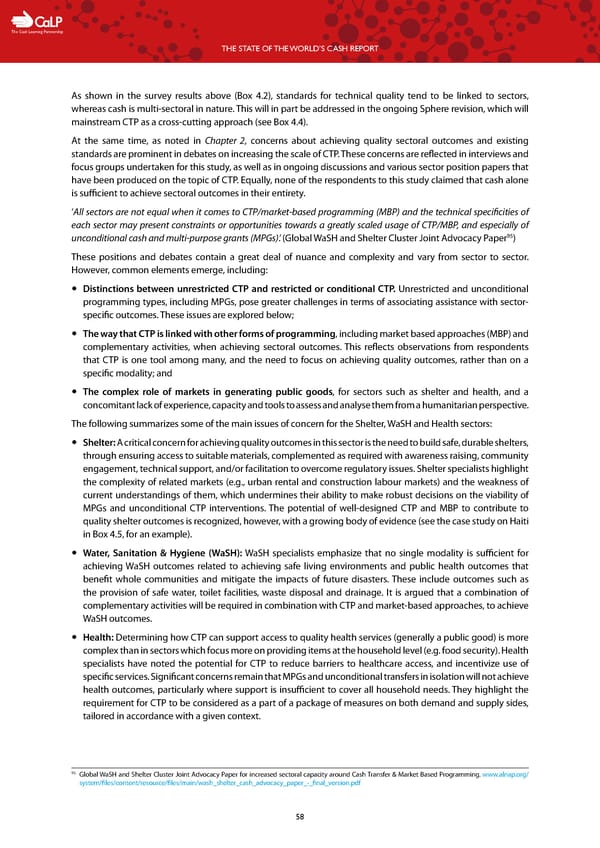C The Cash Learning Partnership THE STATE OF THE WORLD’S CASH REPORT As shown in the survey results above (Box 4.2), standards for technical quality tend to be linked to sectors, whereas cash is multi-sectoral in nature. This will in part be addressed in the ongoing Sphere revision, which will mainstream CTP as a cross-cutting approach (see Box 4.4). At the same time, as noted in Chapter 2, concerns about achieving quality sectoral outcomes and existing standards are prominent in debates on increasing the scale of CTP. These concerns are reflected in interviews and focus groups undertaken for this study, as well as in ongoing discussions and various sector position papers that have been produced on the topic of CTP. Equally, none of the respondents to this study claimed that cash alone is sufficient to achieve sectoral outcomes in their entirety. ‘All sectors are not equal when it comes to CTP/market-based programming (MBP) and the technical specificities of each sector may present constraints or opportunities towards a greatly scaled usage of CTP/MBP, and especially of 95 unconditional cash and multi-purpose grants (MPGs).’ (Global WaSH and Shelter Cluster Joint Advocacy Paper ) These positions and debates contain a great deal of nuance and complexity and vary from sector to sector. However, common elements emerge, including: — Distinctions between unrestricted CTP and restricted or conditional CTP. Unrestricted and unconditional programming types, including MPGs, pose greater challenges in terms of associating assistance with sector- specific outcomes. These issues are explored below; — The way that CTP is linked with other forms of programming, including market based approaches (MBP) and complementary activities, when achieving sectoral outcomes. This reflects observations from respondents that CTP is one tool among many, and the need to focus on achieving quality outcomes, rather than on a specific modality; and — The complex role of markets in generating public goods, for sectors such as shelter and health, and a concomitant lack of experience, capacity and tools to assess and analyse them from a humanitarian perspective. The following summarizes some of the main issues of concern for the Shelter, WaSH and Health sectors: — Shelter: A critical concern for achieving quality outcomes in this sector is the need to build safe, durable shelters, through ensuring access to suitable materials, complemented as required with awareness raising, community engagement, technical support, and/or facilitation to overcome regulatory issues. Shelter specialists highlight the complexity of related markets (e.g., urban rental and construction labour markets) and the weakness of current understandings of them, which undermines their ability to make robust decisions on the viability of MPGs and unconditional CTP interventions. The potential of well-designed CTP and MBP to contribute to quality shelter outcomes is recognized, however, with a growing body of evidence (see the case study on Haiti in Box 4.5, for an example). — Water, Sanitation & Hygiene (WaSH): WaSH specialists emphasize that no single modality is sufficient for achieving WaSH outcomes related to achieving safe living environments and public health outcomes that benefit whole communities and mitigate the impacts of future disasters. These include outcomes such as the provision of safe water, toilet facilities, waste disposal and drainage. It is argued that a combination of complementary activities will be required in combination with CTP and market-based approaches, to achieve WaSH outcomes. — Health: Determining how CTP can support access to quality health services (generally a public good) is more complex than in sectors which focus more on providing items at the household level (e.g. food security). Health specialists have noted the potential for CTP to reduce barriers to healthcare access, and incentivize use of specific services. Significant concerns remain that MPGs and unconditional transfers in isolation will not achieve health outcomes, particularly where support is insufficient to cover all household needs. They highlight the requirement for CTP to be considered as a part of a package of measures on both demand and supply sides, tailored in accordance with a given context. 95 Global WaSH and Shelter Cluster Joint Advocacy Paper for increased sectoral capacity around Cash Transfer & Market Based Programming. www.alnap.org/ system/files/content/resource/files/main/wash_shelter_cash_advocacy_paper_-_final_version.pdf 58
 The State of the World's Cash | Full Report Page 59 Page 61
The State of the World's Cash | Full Report Page 59 Page 61